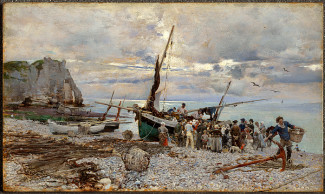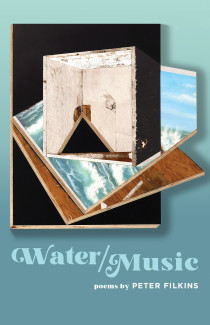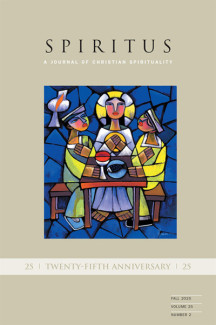
Johns Hopkins UniversityEst. 1876
America’s First Research University
Now Browsing:
The Painted Poem

Measuring only 5 ½ x 9 7/16 inches, Giovanni Boldini’s 1879 painting Return of the Fishing Boats, Étretat, has long been one of my favorites at The Clark Art Institute in Williamstown, MA. Indeed, there are far greater paintings by Monet, Renoir, Degas, and Turner to be found in the museum, but whenever I visit, it is always the Boldini that I return to, once again taking in the salt tang of its sea, the cold wet of its rocky shore, the feel of sea life and village life meeting at a shared margin. Its vivid naturalism, however, is not what captivates me. Rather, it is its size. Were it done on a far larger scale, I doubt I would find it half so appealing, for in its smallness, in its compression, lies its pungency.

And thus it’s a perfect fit for a poem. After many years of enjoying its glistening vibrancy, there seemed nothing for it but to try to render the same, the result being:
On the border between nature and culture is where I hope that my collection Water / Music dwells. The sea is our origin, and from its navigation and cultivation (however fraught in these late times) comes our history, if not the very existence of art itself. On the liminal edge of land and sea, human life transpires, and yet without Boldini, we would not have such an impactful view of it before us. Poems, in their similar urge for order and consequence, do the same. Before us lies a world, or better yet, a world rendered in oil on canvas, or better yet again, a momentary collision of nature, view, and language condensed into a poem.
Nor does one need a painting to inspire the same. Looked at the right way, most any natural setting can offer up stimulating visuals that render fresh images for a poem. Having lived for many years on the edge of a lake in western Massachusetts, my eye is always peeled. One morning in summer, a host of swallows wheeling over water eventually led to this:
I say “eventually,” for of course one does not just sit down and whip up the poem in the face of nature or experience, but instead returns to the energy of whatever words it might give rise to, trying them this way, revising towards that, hopefully getting the poem “eventually” to a place where word and image and sound cohere, lock in, and become as material and imminent as a painting, as fluid and alive as water’s music itself.
Peter Filkins is a poet who teaches writing and literature at Bard College at Simon’s Rock and translation at Bard College. He is the author of What She Knew, After Homer, the chapbook Augustine’s Vision, and The View We’re Granted, which received the 2013 Best Book Award from the New England Poetry Club. He has also translated the poetry and novels of Ingeborg Bachmann and the novels of H. G. Adler. Filkins’s most recently published collection is Water / Music. A list of his upcoming readings and events can be found on his website, peterfilkins.com.
Order Water / Music: Poems by Peter Filkins at the following link: https://jhupbooks.press.jhu.edu/title/water-music


Image: Giovanni Boldini, Return of the Fishing Boats, Étretat. Image courtesy Clark Art Institute. clarkart.edu
And thus it’s a perfect fit for a poem. After many years of enjoying its glistening vibrancy, there seemed nothing for it but to try to render the same, the result being:
Boldini’s Catch
Giovanni Boldini, 1879
Safely ashore, Boldini’s catch is in:
anchor planted among the clatter of rocks,
the villagers crowd around, lost to the din
of fishwife and monger arguing the cost
of the day’s live haul – conger teeming in vats
we do not see, but sense, perhaps imagine,
subject as we are to this Êtretat
composed of canvas, pigment, oil and resin
awash with sea brine, mottled light that swells
with the gull’s far cry and an ocean’s smell.
Giovanni Boldini, 1879
Safely ashore, Boldini’s catch is in:
anchor planted among the clatter of rocks,
the villagers crowd around, lost to the din
of fishwife and monger arguing the cost
of the day’s live haul – conger teeming in vats
we do not see, but sense, perhaps imagine,
subject as we are to this Êtretat
composed of canvas, pigment, oil and resin
awash with sea brine, mottled light that swells
with the gull’s far cry and an ocean’s smell.
On the border between nature and culture is where I hope that my collection Water / Music dwells. The sea is our origin, and from its navigation and cultivation (however fraught in these late times) comes our history, if not the very existence of art itself. On the liminal edge of land and sea, human life transpires, and yet without Boldini, we would not have such an impactful view of it before us. Poems, in their similar urge for order and consequence, do the same. Before us lies a world, or better yet, a world rendered in oil on canvas, or better yet again, a momentary collision of nature, view, and language condensed into a poem.
Nor does one need a painting to inspire the same. Looked at the right way, most any natural setting can offer up stimulating visuals that render fresh images for a poem. Having lived for many years on the edge of a lake in western Massachusetts, my eye is always peeled. One morning in summer, a host of swallows wheeling over water eventually led to this:
Writings
swallows at daybreak –
pure inviolate sounds
the flit and splutter
of their antic rounds
across lake glass
dipping their tails
mid-flight and lambent
translucent inkwells
left pooled and pooling
toward the outer shore
a water-pocked trail
their signature
swallows at daybreak –
pure inviolate sounds
the flit and splutter
of their antic rounds
across lake glass
dipping their tails
mid-flight and lambent
translucent inkwells
left pooled and pooling
toward the outer shore
a water-pocked trail
their signature
I say “eventually,” for of course one does not just sit down and whip up the poem in the face of nature or experience, but instead returns to the energy of whatever words it might give rise to, trying them this way, revising towards that, hopefully getting the poem “eventually” to a place where word and image and sound cohere, lock in, and become as material and imminent as a painting, as fluid and alive as water’s music itself.
Peter Filkins is a poet who teaches writing and literature at Bard College at Simon’s Rock and translation at Bard College. He is the author of What She Knew, After Homer, the chapbook Augustine’s Vision, and The View We’re Granted, which received the 2013 Best Book Award from the New England Poetry Club. He has also translated the poetry and novels of Ingeborg Bachmann and the novels of H. G. Adler. Filkins’s most recently published collection is Water / Music. A list of his upcoming readings and events can be found on his website, peterfilkins.com.
Order Water / Music: Poems by Peter Filkins at the following link: https://jhupbooks.press.jhu.edu/title/water-music

Login to View & Leave Comments
Login to View & Leave Comments


